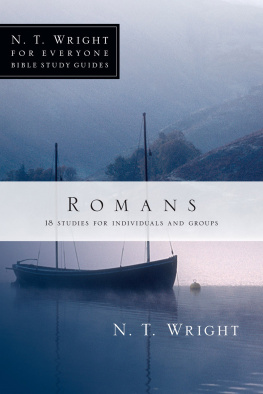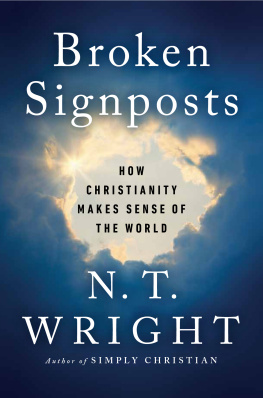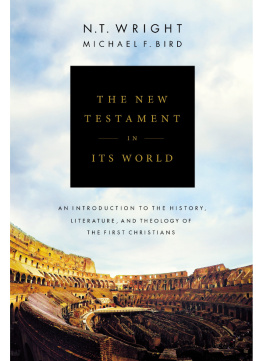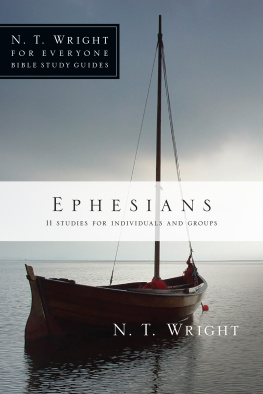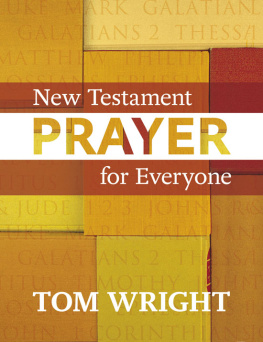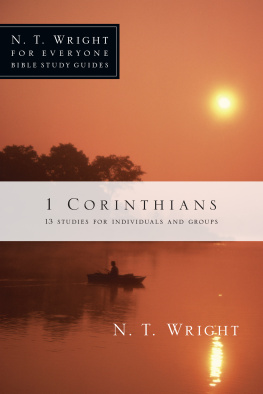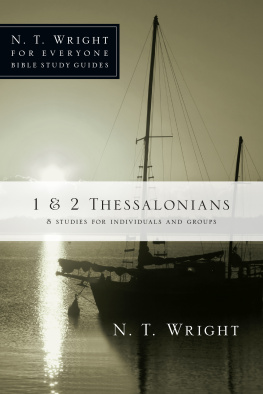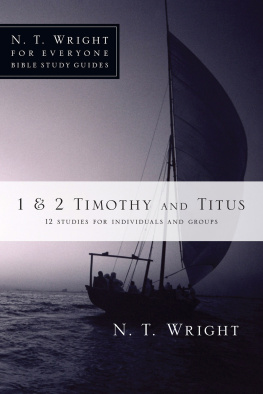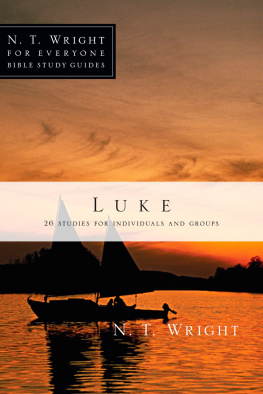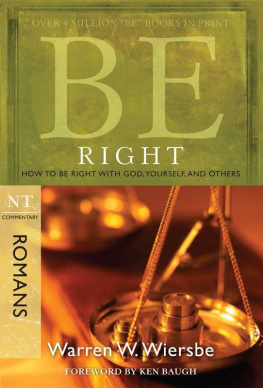Sommaire
Pagination de l'dition papier
Guide
ROMANS
18 STUDIES FOR INDIVIDUALS AND GROUPS
N. T. WRIGHT
WITH PATTY PELL
InterVarsity Press
P.O. Box 1400, Downers Grove, IL 60515-1426
World Wide Web: ivpress.com
E-mail: email@ivpress.com
2009 by Nicholas Thomas Wright
All rights reserved. No part of this book may be reproduced in any form without written permission from InterVarsity Press.
This study guide is based on and includes excerpts adapted from Paul for Everyone: Romans, Part One, , 2004 Nicholas Thomas Wright. All Scripture quotations, unless otherwise indicated, are taken from the New Testament for Everyone. Copyright 2001-2008 by Nicholas Thomas Wright. Used by permission of SPCK, London. All rights reserved.
InterVarsity Press is the book-publishing division of InterVarsity Christian Fellowship/USA, a movement of students and faculty active on campus at hundreds of universities, colleges and schools of nursing in the United States of America, and a member movement of the International Fellowship of Evangelical Students. For information about local and regional activities, write Public Relations Dept., InterVarsity Christian Fellowship/USA, 6400 Schroeder Rd., P.O. Box 7895, Madison, WI 53707-7895, or visit the IVCF website at .
Cover design: Cindy Kiple
Cover image: Ashley Franklin/Trevillion Images
Interior image: Clipart.com
978-0-8308-6916-9 (digital)
978-0-8308-2186-0 (print)
This digital document has been produced by Nord Compo.
GETTING THE MOST
OUT OF ROMANS
F rom time to time, scientists have sent space probes to Mars. The object of the exercise is, of course, to try to find out more about the planet which, although its our nearest neighbor, is still over a hundred million miles away. For centuries people have imagined that there might be life on Mars, perhaps intelligent life. There are undoubtedly many new things to be learned, to be discovered. If only we could get there safely and work out what was going on.
A lot of people feel like that about Paul in general, and Romans in particular. Most people who have at least a nodding acquaintance with the Christian faith are aware that Paul was a striking and important figure in its early days. Many know that Romans is his greatest letter. Some may even have heard of the powerful effect this letter has had, over and over again, in the history of the church: great figures like Augustine, Luther and Karl Barth have studied it and come back with a fresh and challenging word from God. But, to many Christians in the Western world, Romans remains as much of a mystery as Mars. I tried to read it once, they say, like a scientist describing yet another failed space probe, but I got bogged down and I couldnt work it out.
A different problem lies in wait for those who have learned the Christian faith in the Western world. Many traditional Roman Catholics, and others in similar traditions, know that the Protestants have made Paul a great hero and are therefore suspicious of him. But there are problems for Protestants too.
Ever since the Reformation in the sixteenth century, many churches have taken Paul as their main guide, and have seen Romans as the book, above all, in which he sets out the basic doctrines they hold. Since part of my own background is firmly in this traditionwhich is why I began studying this letter intensively for myself thirty years agoI understand the power and importance of this tradition. But I have to report that it has only colonized certain parts of the great planet called Romans. It has mapped and discussed many craters, has analyzed many substances found in them, and has laid down well-trodden roads across some of the planets surface. But there are other parts which have remained a mysterynot the least the parts about the coming together of Jews and Gentiles, which Paul comes back to again and again throughout the letter.
It is time for some new mapping, for paths to be hacked through unexplored territory. (For more on this letter, also see my Paul for Everyone: Romans, Part One and Paul for Everyone: Romans, Part Two, on which this guide is based, published by SPCK and Westminster John Knox.) We still need the old maps and roads, of course. We wont lose anything that they gave us. In fact, we shall find that we get more out of them by seeing and using them within Pauls own larger picture, of God, Jesus, the world and ourselves.
As we work through Romans in this guide (prepared with the help of Patty Pell, for which I am grateful), we may sometimes feel we are being swept along in a small boat on a swirling, bubbling river. We need to hold on tight if were going to stay on board. But if we do, the energy and excitement of it all is unbeatable. The reason is obvious: because Romans is all about the God who, as Paul says, unveils his power and grace through the good news about Jesus. And, as Paul insists again and again, this power and grace is available for everyone who believes.
SUGGESTIONS FOR INDIVIDUAL STUDY
1. As you begin each study, pray that God will speak to you through his Word.
2. Read the introduction to the study and respond to the Open question that follows it. This is designed to help you get into the theme of the study.
3. Read and reread the Bible passage to be studied. Each study is designed to help you consider the meaning of the passage in its context. The commentary and questions in this guide are based on my own translation of each passage found in the companion volume to this guide in the For Everyone series on the New Testament (published by SPCK and Westminster John Knox).
4. Write your answers to the questions in the spaces provided or in a personal journal. Each study includes three types of questions: observation questions, which ask about the basic facts in the passage; interpretation questions, which delve into the meaning of the passage; and application questions, which help you discover the implications of the text for growing in Christ. Writing out your responses can bring clarity and deeper understanding of yourself and of Gods Word.
5. Each session features selected comments from the For Everyone series. These notes provide further biblical and cultural background and contextual information. They are designed not to answer the questions for you but to help you along as you study the Bible for yourself. For even more reflections on each passage, you may wish to have on hand a copy of the companion volume from the For Everyone series as you work through this study guide.
6. Use the guidelines in the Pray section to focus on God, thanking him for what you have learned and praying about the applications that have come to mind.
SUGGESTIONS FOR GROUP MEMBERS

